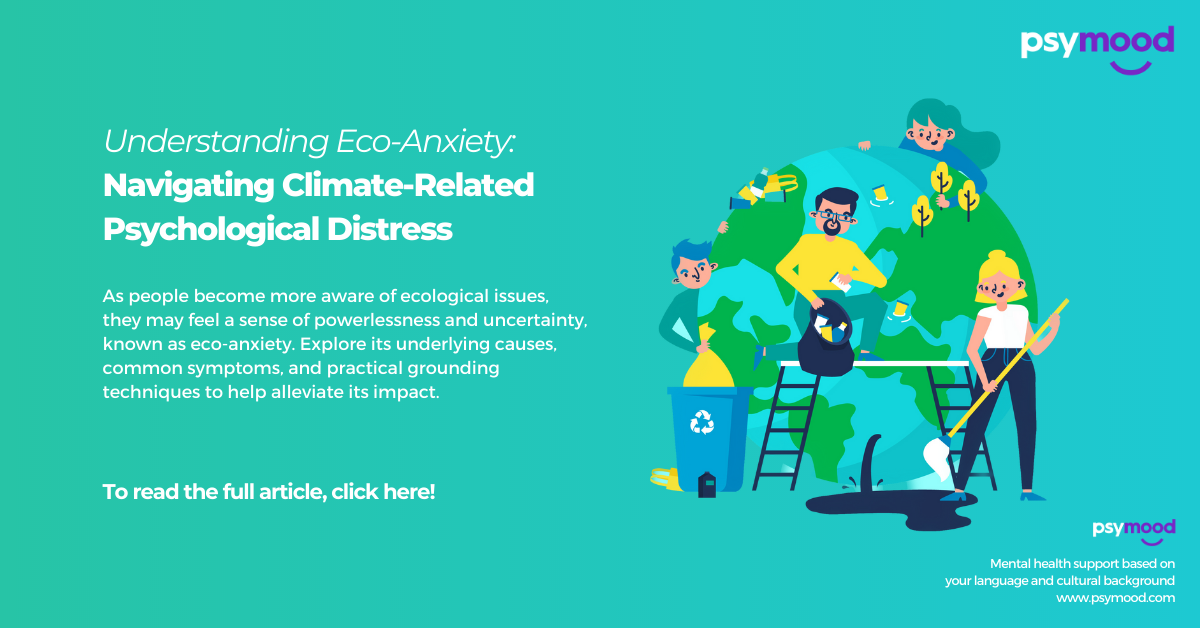Understanding Eco-Anxiety: Navigating Climate-Related Psychological Distress
As the global conversation surrounding climate change intensifies, so too does the emotional toll it takes on individuals. One such manifestation of this distress is known as eco-anxiety. This article aims to shed light on the nature of eco-anxiety, its underlying causes, and common symptoms, and offer practical grounding techniques to help alleviate its impact. Additionally, we will explore how therapy can provide valuable support to individuals grappling with eco-anxiety.
Understanding Eco-Anxiety:
Eco-anxiety, sometimes referred to as climate anxiety or environmental anxiety, is a psychological response to the growing awareness and concerns about the environmental crisis. It emerges from the deep emotional distress and fear experienced by individuals who perceive the ecological challenges faced by our planet and worry about its future. This anxiety can affect people of all ages, backgrounds, and levels of environmental awareness.
Causes of Eco-Anxiety:
Several factors contribute to the development of eco-anxiety. First and foremost is the overwhelming scientific evidence and media coverage of climate change, which highlights the severity of the crisis. As people become more aware of ecological issues, they may feel a sense of powerlessness and uncertainty about their ability to make a meaningful impact. The loss of biodiversity, extreme weather events, deforestation, and other ecological disruptions can also intensify eco-anxiety.
Symptoms of Eco-Anxiety:
Individuals experiencing eco-anxiety may exhibit a wide range of emotional and physical symptoms. Emotionally, they may feel overwhelmed, hopeless, or preoccupied with environmental concerns. They may experience sadness, anger, guilt, or a constant sense of impending doom. Physically, eco-anxiety can manifest as sleep disturbances, appetite changes, headaches, muscle tension, and even panic attacks. Additionally, it can impair concentration, lead to a decrease in productivity, and strain interpersonal relationships.
Grounding Techniques to Alleviate Symptoms:
While addressing eco-anxiety requires systemic changes on a global scale, individuals can adopt certain grounding techniques to help manage their symptoms. Engaging in nature-based activities like gardening, hiking, or spending time in green spaces can provide solace and a sense of connection to the natural world. Mindfulness practices such as meditation, deep breathing exercises, and yoga can help individuals center their thoughts and find inner calm. Limiting exposure to distressing environmental news, fostering social support networks, and taking positive action within their immediate communities are also effective strategies.
The Role of Therapy:
When eco-anxiety becomes debilitating or significantly affects daily functioning, seeking professional help is crucial. Therapy offers a safe and supportive space to explore and address eco-anxiety. A therapist can help individuals develop coping strategies, challenge negative thought patterns, and provide education on climate-related issues. Cognitive-behavioural therapy (CBT), mindfulness-based therapies, and ecotherapy are some approaches that can be tailored to suit the needs of individuals with eco-anxiety. Therapeutic interventions can empower individuals to find resilience, channel their concerns into constructive action, and foster a sense of agency amid the challenges.
Eco-anxiety is a valid and understandable response to the pressing ecological issues our planet faces. Acknowledging and addressing this anxiety is vital for both individual well-being and collective action toward a sustainable future. By implementing grounding techniques and seeking professional support through therapy, individuals can navigate eco-anxiety, find solace, and play an active role in preserving our planet for generations to come.
Do you experience eo-anxiety and are looking for the right mental health specialist for you? PsyMood can help you find a specialist who speaks your language and shares your cultural background. Click here to find the best specialist for you!
PsyMood is a digital tool designed to help you find the support you need in the language that you are most comfortable with. PsyMood considers cultural background, geographical location, interests, and personal needs, amongst other factors, to pair you with service providers for either online or in-person therapy sessions.
For More Interesting Posts
You may also be interested in learning more about What is Anxiety? Four ways to take control of your anxiety disorder.


.png)
.png)
.png)
Recent Comments